|
|
|
Sort Order |
|
|
|
Items / Page
|
|
|
|
|
|
|
| Srl | Item |
| 1 |
ID:
145023
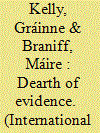

|
|
|
|
|
| Summary/Abstract |
Addressing the estrangement of distinct identity groups as a result of violent conflict is a challenging and persistent socio-psychological peacebuilding imperative. In the immediacy of a peace agreement, priority is given to pressing security and institutional arrangements, particularly within the context of substantial external intervention. Northern Ireland represents an interesting case study, as early and targeted attention was paid to the divisions between the two main communities in the region. And yet, despite substantial economic investment, the detail of how interventions aimed at addressing poor relations have been informed, designed and achieved has not been readily accessible. Focusing on grassroots-based relational and reconciliation processes, this article contends that the failure to document, analyse and adequately disseminate these approaches has resulted in community-level peacebuilding which is unnecessarily extemporary, and the focus on delivery has militated against cultures of learning, reflexivity and generosity in the sharing of good practice.
|
|
|
|
|
|
|
|
|
|
|
|
|
|
|
|
| 2 |
ID:
113103
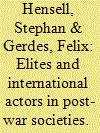

|
|
|
|
|
| Publication |
2012.
|
| Summary/Abstract |
This article analyses the efforts of external actors to influence opportunities for national political elites to gain or maintain positions of power in post-conflict societies. The analysis compares the cases of Liberia and Kosovo, both of which have been characterized by high levels of external intervention though with significant differences in the scope of authority of external actors. Despite these differences, similar dynamics have characterized elite formation in both countries. The impact of external actors on elite systems is mostly indirect, and chances for accumulating authority provided by the national setting determine elite careers. External actors bow to these national conditions rather than decisively changing them.
|
|
|
|
|
|
|
|
|
|
|
|
|
|
|
|
| 3 |
ID:
163699
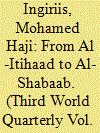

|
|
|
|
|
| Summary/Abstract |
External intervention has frustrated and continues to frustrate peace and stability in the Horn of Africa and Somalia, adding various adverse layers to an already complicated and complex conflict. The level of forceful military engagement intended for regional domination has profoundly affected negatively the efforts of peacebuilding and statebuilding in Somalia. This article examines how the earlier Ethiopian policies towards Somalia has reshaped the (post)-Cold War politics of the Horn. In doing so, it traces the roots of the Ethiopian intervention in Somalia vis-à-vis new non-state armed groups to chart the changing political dynamics of the conflict in Somalia. By using historical approach, the article argues that Ethiopia’s agenda is central to understanding why the ‘War on Terror’ has strengthened and subsequently midwifed armed militant movements (e.g. new insurgency groups) in Somalia, starting from Al-Itihaad to today’s Al-Shabaab. In focusing upon various regional actors and groups, the article moves from the emphasis of internal systems to external power structures, considering the wider historical and political factors in the region that must be closely examined if the regional and local conflicts are to be deeply understood. While it is a context-specific study, the article aims to contribute fresh perspectives and insights to ongoing discussions on the consequences of the Ethiopian intervention in Somalia.
|
|
|
|
|
|
|
|
|
|
|
|
|
|
|
|
| 4 |
ID:
143170
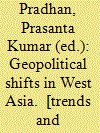

|
|
|
|
|
| Publication |
New Delhi, Pentagon Press, 2016.
|
| Description |
xxxiv, 246p.: maps, figures , tableshbk
|
| Standard Number |
9788182748774
|
|
|
|
|
|
|
|
|
|
|
|
Copies: C:2/I:0,R:0,Q:0
Circulation
| Accession# | Call# | Current Location | Status | Policy | Location |
| 058443 | 320.12/PRA 058443 | Main | On Shelf | General | |
| 058444 | 320.12/PRA 058444 | Main | On Shelf | General | |
|
|
|
|
| 5 |
ID:
131420
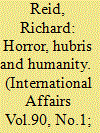

|
|
|
|
|
| Publication |
2014.
|
| Summary/Abstract |
This article examines the international engagement with Africa from the First World War and the apex of colonial rule through to the present day. It is argued that there have been dramatic shifts throughout this period-from increasing interventionism on the part of the colonial state, to decolonization and the emergence of nation-states with independent foreign policy programmes, to the predations and influences of the Cold War, to the developmentalism and humanitarianism of the contemporary era. Yet, there has also been marked continuity in terms of policy, perception and practice. In particular, Africa has long been seen in terms of economic opportunity-a place where markets and raw materials abound-and of military and political threat, a place in which intrinsic instability makes external intervention both desirable and inevitable. While immediate contexts have changed over time, the international engagement with the continent remains essentially economic and military. A concern for democratization and development represents a relatively new element, although even this can be traced to the paternalistic humanitarianism of the colonial era and, earlier still, moral stances toward Africa in the nineteenth century.
|
|
|
|
|
|
|
|
|
|
|
|
|
|
|
|
| 6 |
ID:
186077
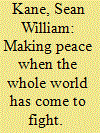

|
|
|
|
|
| Summary/Abstract |
After a quarter-century during which it was a relatively rare phenomenon, external military intervention is now a common occurrence during contemporary civil war. Research has highlighted the additional challenges that this poses for peacemaking, but to date has not identified evidence to inform mediators assisting negotiations to resolve internationalized civil conflict. This paper addresses this inadequacy by undertaking a structured, focused comparison of a series of mediation processes in six internationalized civil wars during in the 1980s. I find that effective mediation in this era involved now unfamiliar negotiation process designs related to the types of mandates issued to mediators, participation arrangements for talks and strategic choices on how to best sequence and symbiotically link the external and internal dimensions of civil war negotiations. Likewise, internationalized civil wars introduce a distinct class of issues for negotiation, including troop withdrawals and curtailing outside military assistance, non-intervention pledges, possible foreign policy reform of the civil war state and bespoke international roles in implementation. The paper closes by considering the issue of ripeness in relation to internationalized civil wars and the possible applications of these findings to contemporary mediation processes.
|
|
|
|
|
|
|
|
|
|
|
|
|
|
|
|
| 7 |
ID:
122423
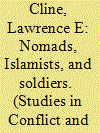

|
|
|
|
|
| Publication |
2013.
|
| Summary/Abstract |
Mali has been faced with a series of uprisings by its Tuareg over a number of years. Although each of these rebellions was ended by a cease-fire, the Malian government never succeeded in instituting longer term peace agreements. The 2012 Tuareg rebellion has presented even more significant security threats. The environment in northern Mali now is marked by multiple armed groups, with multiple competing agendas. This complex situation, with Tuareg rebels, Islamists with varying goals, and local militias, with a pattern of varying levels of cooperation and conflict, will at best be very difficult to resolve in the long term. Combined with an almost complete security vacuum in northern Mali on the part of the government, this situation could be intractable even with external intervention. At the same time, the focus on counterterrorism in northern Mali may not be conducive to a long-term resolution of what in reality is a much more complicated security environment.
|
|
|
|
|
|
|
|
|
|
|
|
|
|
|
|
| 8 |
ID:
123995
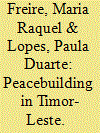

|
|
|
|
|
| Publication |
2013.
|
| Summary/Abstract |
This article highlights the importance of interaction between peace missions and local dynamics, drawing on Tsing's work on frictions. It is centred on the United Nations (UN) peace intervention in Timor-Leste, discussing different examples of frictions, which have the potential to undermine or empower the peacebuilding efforts underway. The analysis stresses the unpredictable effects of applying the UN liberal peace model. It is argued that processes of friction, often consisting of an incremental build-up of intermediate results shape and form the (un)sustainability of any peacebuilding process initiated by an external intervention and, consequently, should be identified and analysed in order to enhance or minimize their positive/negative contribution towards building peace.
|
|
|
|
|
|
|
|
|
|
|
|
|
|
|
|
| 9 |
ID:
119433
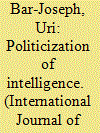

|
|
|
|
|
| Publication |
2013.
|
| Summary/Abstract |
The mistaken October 2002 National Intelligence Estimate of Iraq's weapons of mass destruction (WMD) capabilities, 1 and the claims that it was biased by political pressures, again brought to light the issue of the politicization of analytical intelligence products in democratic states. Top-down politicization is usually defined as "the manipulation of intelligence to reflect policy preferences." 2 More precisely, it is any external intervention in the elements of intelligence work which should be kept objective, autonomous, and free of political influence. Included are three stages of the intelligence process-collection, processing, and production-as well as certain elements of the planning, direction, and dissemination stages, which should be carried out solely on the basis of professional considerations. "External intervention" implies that politicization can be done not only by politicians but also by other consumers of the intelligence product, such as military officers and diplomats.
|
|
|
|
|
|
|
|
|
|
|
|
|
|
|
|
| 10 |
ID:
120431
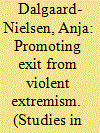

|
|
|
|
|
| Publication |
2013.
|
| Summary/Abstract |
A number of Western countries are currently adding exit programs targeting militant Islamists to their counterterrorism efforts. Drawing on research into voluntary exit from violent extremism, this article identifies themes and issues that seem to cause doubt, leading to exit. It then provides a perspective on how these natural sources of doubt might best be brought to bear in connection with an exit program by drawing on social psychology and research into persuasion and attitude change. It is argued that an external intervention should stay close to the potential exiter's own doubt, make the influence attempt as subtle as possible, use narratives and self-affirmatory strategies to reduce resistance to persuasion, and consider the possibility to promote attitudinal change via behavioral change as an alternative to seek to influence beliefs directly.
|
|
|
|
|
|
|
|
|
|
|
|
|
|
|
|
| 11 |
ID:
173387
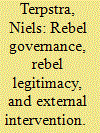

|
|
|
|
|
| Summary/Abstract |
This article focuses on rebel governance and rebel legitimacy during civil war. It investigates how external intervention in support of an incumbent government and withdrawal of external forces shape rebel legitimacy dynamics and rebels’ opportunities to govern. It adopts a longitudinal perspective on Afghanistan’s Taliban, analyzing three phases of the movement’s existence. Moral forms of legitimacy resonated particularly during instances of external intervention, whereas pragmatic forms of legitimacy became more relevant after the withdrawal of external forces and during periods of the Taliban’s opponents’ ineffective governance. The article is based on a literature review and fieldwork in Afghanistan.
|
|
|
|
|
|
|
|
|
|
|
|
|
|
|
|
| 12 |
ID:
119278
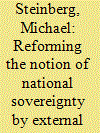

|
|
|
|
|
| Publication |
2013.
|
| Summary/Abstract |
In principle, national sovereignty is the right of a nation to govern its internal affairs without foreign interference. In practice, it is defined by one's interpretation of international law, which may permit legal external intervention under some circumstances, ultimately removing a nation's sovereignty. This paper will examine the current system of international law outlined by the United Nations, analyse the ambiguities contained within its Charter and elaborate on how external intervention can be justified. The case-study of recent developments related to Libya will demonstrate that the manner in which international law is interpreted is changing the notion of principles of sovereignty.
|
|
|
|
|
|
|
|
|
|
|
|
|
|
|
|
| 13 |
ID:
128852
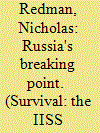

|
|
|
|
|
| Publication |
2014.
|
| Summary/Abstract |
As Russia mulls its next move in Ukraine, consideration of its allies' reactions might have greater weight than the response of the West. The strength of Russia's reaction to events in Ukraine should have surprised no one. Two of the major preoccupations of Russian foreign policy in the last decade have been efforts to bolster governments under assault from their restive populations and, from Moscow's perspective, the threat of external intervention, and a determination to establish and defend a zone of privileged interests across the former Soviet Union by making progress with its integration projects. In Ukraine in February 2014, those two preoccupations came into full alignment. Margelov's statement captures Russia's general disapproval of the disorder created by the Arab Spring, and the sense of an immediate threat to Russia that is implicit in an EU-assisted coup d'état happening on its doorstep.
|
|
|
|
|
|
|
|
|
|
|
|
|
|
|
|
| 14 |
ID:
108062
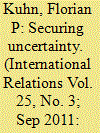

|
|
|
|
|
| Publication |
2011.
|
| Summary/Abstract |
The theoretical concept John Herz called a 'security dilemma' has rarely been applied to sub-state social figurations, although security dilemmas do shape political behaviour in post-conflict peacebuilding. Comparable to state formation, sub-state groups develop institutional capacities. Often led by 'warlords' or 'strongmen', these entities resemble states within, while lacking recognition and legitimacy from without. Between these entities arises a sub-sovereign form of security dilemma. It is a result of uncertainty about the other's motives regarding expansion, control of sources of funding, or domination within the legal order of the 'state'. When statebuilding is pursued by external actors, aiming to fill the legal void, the 'state' can become a source of existential risks for sub-state entities. Risks - from extinction to the transformation of a group's socio-political identity - can stem from another sub-state group taking over the state, appropriating superior means of coercion and hence enabling itself to subjugate others; relative deprivation concerning external funding or revenue from trade or smuggling; or loss of investment in networks of patronage, favourable terms of trade, or monopolies for certain goods. External support adds considerable uncertainty about interventionists' capabilities, willingness and ability to steer and control statebuilding efforts. This article explores how risks and their perception shape interaction between social actors and at the same time how awareness and consideration of these risks may influence external actors' behaviour. It argues that understanding risk constellations within an intervention and their processual transformation is vital for external statebuilding support.
|
|
|
|
|
|
|
|
|
|
|
|
|
|
|
|
| 15 |
ID:
147479
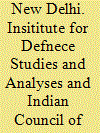

|
|
|
|
|
| Publication |
New Delhi, IDSA, 2001.
|
| Description |
xxi, 272p.hbk
|
| Standard Number |
8186019480
|
|
|
|
|
|
|
|
|
|
|
|
Copies: C:1/I:0,R:0,Q:0
Circulation
| Accession# | Call# | Current Location | Status | Policy | Location |
| 058792 | 320.15/NEW 058792 | Main | On Shelf | General | |
|
|
|
|
| 16 |
ID:
184919
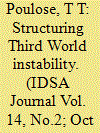

|
|
|
|
|
|
|
|